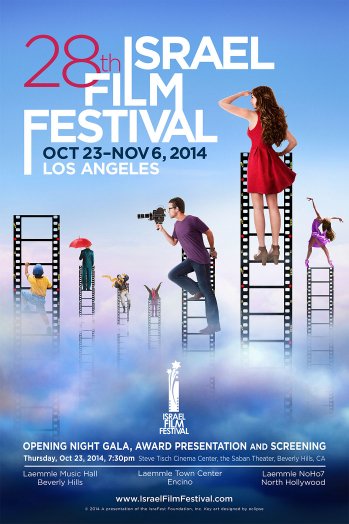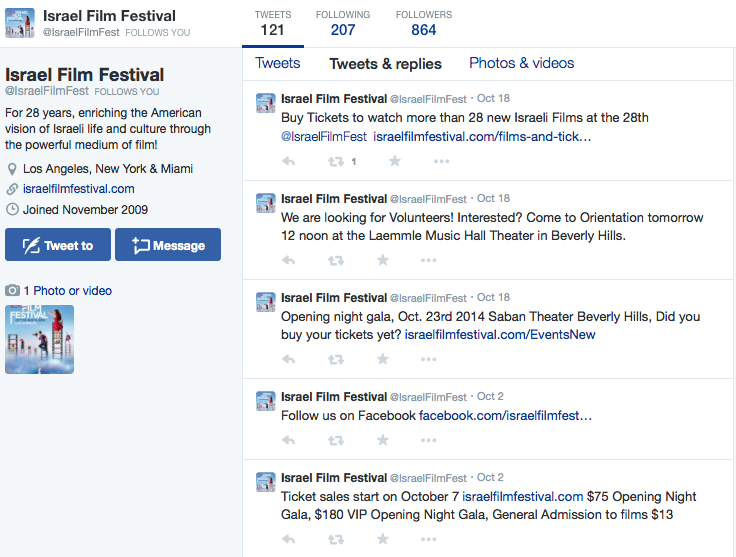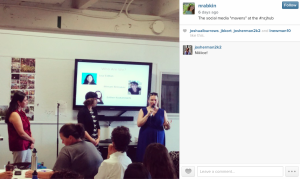Posts tagged twitter

Social Media Case Study: Unsolicited Advice for the Israel Film Festival
0When I lived in New York, one of the focal points of my entertainment year was the Israel Film Festival. My friends and I, pre-Hulu, pre-Netflix, pre-much-of-anything-other-than-mainstream-modes-of-entertainment, eagerly anticipated the annual display of Jewiness-on-film meets Zionism, the Jewish geography and Hebrew immersion experience that was the Festival. We all knew when the Festival was happening, where it was happening and what was playing. I remember that most of the shows were sold out well in advance, because of the collective New York Israel-loving-and-missing community, many of us in our twenties. We planned outings, doing dinner or drinks first at a local bar or on several occasions, sinking into New York cliche with frozen hot chocolate at Serendipity, which had the convenience of being nearby the theater.
And all of that was before social media.
Since I moved to LA, I’ve either been out of town for the IFF (my fault, but usually because I’m in Israel), or have been in town but have been unaware that it’s happening. This doesn’t seem possible, as I spend most of the day online and connected to the Jewish world. I follow the IFF on Twitter, and subscribe to their FB page, as well as email blasts from the Jewish Journal and the IAC. This year, one of my friends posted about it on Facebook. But if not for that, I might have woken up someday next week and learned that I had missed it yet again.
Theoretically, in this age of hyper-connectivity, I should have been overwhelmed with communications regarding the IFF, both in advance and once it was underway. So why wasn’t I? Part of the problem is that communications are overwhelming generally – since I rarely pick up a copy of the Jewish Journal and read only selected articles online, it’s not the mainstream media that’s the problem as much as it is the evolving way we consume that information. And it might be, in part, because their social media presence is so minimal and they are failing to mobilize the audience (and their sponsors) as brand ambassadors and PR agents.
Because Facebook is an inexplicable mystery when it comes to assessing the potential for organic reach without advertising (and because they should be advertising to LA Jews and don’t seem to be), let’s take a look at the Twitter account for @israelfilmfest.
Their account, since November 2009, has tweeted 121 times. They have under 1000 followers. Most of the “people” they’re “following” on Twitter aren’t people at all: they’re other Film Festivals (who are not likely to share, retweet or publicize the IFF’s efforts) and organizations (some partners, who should be sharing/retweeting/publicizing, but don’t seem to be). And – most disturbingly – only have tweeted 5 times in the month of October, precisely when tweets should have been, if not fast and furious, then laden with information, tempting offers and tidbits about the festival’s films. The website links to a few pieces about the Festival, but imagine the reach of those pieces expanded by social media…
This advice is unsolicited. But because I love the Festival, I’m sharing some tips about how to do it better next year (or at the other two outings of the festival, upcoming in Miami and New York….but don’t ask me when those are or were, since that info doesn’t seem to be on the IFF website).
1. Use your assets in promoting the festival. The filmmakers. The content of their work. Their actors. People in LA who are Israeli or support Israeli culture. Local kosher/Israeli establishments. Festival partners. Organizations who aren’t financial sponsors, but could be content partners. And the organizers should have shot wide in terms of the angles that could be explored for coverage. For instance:
- People who are in the know about Israeli music get giddy at the fact that Meir Fenigstein founded and runs the Festival, it’s like being in the same room with one of the Beatles. Why isn’t there an article about Poogy/Kaveret, or about the music of Israeli films?
- Fenigstein told a story at the screening of “The Go-Go Boys” about Menahem Golan’s role in suggesting and sponsoring the first IFF. Why wasn’t that a first-person piece (or an interview) in the Jewish Journal, Variety, THR, The Writer’s Guild, the Academy of Motion Picture Arts & Sciences, or EW?
- Cannon Films, the Golan/Globus production company that became huge in the 80s and is the focus of The Go-Go Boys,” producing Death Wish, Bloodsport & Breakin’, must have inspired dozens of filmmakers (in addition to Eli Roth, who is featured in the film). Maybe pitch Quentin Tarantino on writing something about his favorite Cannon Films outing, or invite Eli Roth to introduce the film at the Festival? (They may have, but these are the types of ideas I mea when I say “shooting wide…” in regard to PR.)
2. Enhance your social media presence. Ideally, hire someone (or designate a web-savvy volunteer) to coordinate a multi prong social media approach, including (at minimum) Facebook, Twitter & Instagram. But I know sometimes Jewish nonprofits can’t allocate those funds, in which case less ideal but still a plan, hire a consultant to create a plan for you to implement before during and after the festival. And that’s #3…
3. Create a content plan, including a commitment to Tweeting regularly leading up to and during the festival. In addition to varying the types of content posted (trivia, Q&A about the festival or its films, short video clips, shoutouts to filmmakers, links to purchase etc), this content plan should also clearly identify the goals of each week’s social media outreach. Which week will be primarily about promotion and identifying potential partners/sponsors? Which week will be about getting people in the seats? Which week will be about celebrating the people who come and the energy on-site? (That there are NO PHOTOS on the Photos tab on the website as of November 2 – a week into the festival with almost a week to go – is not a good sign.)
Keeping Twitter current and active on its own (or even using magical Facbeook advertising) isn’t necessarily going to sell out the festival. But today, there are so many (free or mostly free) tools that are available – why not use them?
(If the folks at the IFF want help with this next year, they can feel free to be in touch. I’ll give them a decent rate, I promise. :))
Want more posts like this one? Consider joining my new mailing list. No spam, no overwhelming emails, just the occasional conversation starter/act of self-promotion. 🙂 Sign up here…

Hashtags & Haystacks – Social Media, “Ranch-Style”
0What’s “Ranch-Style” Social Media? Good question…well, it has little to do with the creamy dressing that people use to dip hot wings and occasionally vegetables into, and everything to do with the location of my last social media training .
I was honored to have been invited by the folks at See3 Communications to be part of the social media boot camp they were conducting for the Leichtag Foundation, a foundation whose mission it is to honor the legacy of Lee and Toni Leichtag through igniting and inspiring vibrant Jewish life, advancing self-sufficiency and stimulating social entrepreneurship in coastal North San Diego County and Jerusalem. The event was held Monday, September 15, at the Leichtag-run ranch in Encinitas (near San Diego), where a number of social entrepreneurship programs and Jewish organizations also were headquartered under an initiative called the North County Jewish Hub. (You can view tweets, photos & vines from the day at #NCJHub.)
My presentation on Twitter provided some best practices, as well as some examples of what constitutes good engagement (like the @midnight #HashtagWars) and what constitutes a Twitter #fail (for instance, the recent DiGiorno’s #WhyIStayed snafu).
The media session provided lots of hints about how to approach – and most importantly, develop ongoing relationships with – members of the media, to maximize your chances of getting coverage for an event or organization.

Twitter and the College Student Population
0 At the recent JFNA General Assembly in New Orleans, I was asked to speak to a group of student journalists for a program called “Do the Write Thing.” The program features speakers from the world of Jewish leadership as well as from Jewish journalism – the session that I co-headlined (with the Jewish Agency’s Florence Broder) was about social media’s role in today’s Jewish journalism. While all of the students understood and used Facebook, and a few of them were familiar with blogs and the concept of blogging, when it came to Twitter, many of them were clueless. One of the attendees, a writer for the Binghamton University Pipe Dream, wrote a piece for that paper and noted that a junior, double-majoring in history and philosophy, politics and law, “stared blankly when asked about Twitter. ‘I barely know what it is,’ she said. ‘Something about birds?’”
At the recent JFNA General Assembly in New Orleans, I was asked to speak to a group of student journalists for a program called “Do the Write Thing.” The program features speakers from the world of Jewish leadership as well as from Jewish journalism – the session that I co-headlined (with the Jewish Agency’s Florence Broder) was about social media’s role in today’s Jewish journalism. While all of the students understood and used Facebook, and a few of them were familiar with blogs and the concept of blogging, when it came to Twitter, many of them were clueless. One of the attendees, a writer for the Binghamton University Pipe Dream, wrote a piece for that paper and noted that a junior, double-majoring in history and philosophy, politics and law, “stared blankly when asked about Twitter. ‘I barely know what it is,’ she said. ‘Something about birds?’”
While the students in the room at DTWT weren’t quite at that level of Twitter illiteracy, their lack of facility – and maybe even interest? – in the tool known as Twitter illustrates a point. Not every person who is young is active in all forms of social media. And while Facebook may be an exception, there is no one social media tool that is being used actively by all young people.
What organizations can take away from this is that although young people are involved in social media, social media is not the universal tool through which a project or organization can reach all young people. Today’s organizations must be educated about the tools that are out there, and know how to use them – but organizations need to adopt flexibility in creating their social media strategies, matching the available time and energy of their staffs to the likely payoff in each of the markets for tools like Twitter, Facebook, LinkedIn, etc.
Social media consultants can help, but so can members of your target demo. Use the tools that are out there – search Twitter and Facebook for conversations relevant to your product or program. And convene focus groups of people in the relevant demo – ask them how they prefer to get information and how they use these tools. Once you know where the people you want to reach dwell, you can know how to knock on the door.
“Globalizing the Shtetl” Presentation Now on SlideShare
0I gave this presentation, “Globalizing the Shtetl,” at the 2010 Jewish Communal Professionals of Southern California Conference, held October 28, 2010 in Malibu, CA.

Your “Twimprimatur,” and Other Secrets of Social Media
0 What’s a Twimprimatur? Here’s a hint: I made it up. And here’s another hint: imprimatur + Twitter. (Imprimatur literally means “let it be printed,” but here are some more definitions.)
What’s a Twimprimatur? Here’s a hint: I made it up. And here’s another hint: imprimatur + Twitter. (Imprimatur literally means “let it be printed,” but here are some more definitions.)
In July, I was interviewed by Rusty Mike Radio in Jerusalem – we went deep into blogging, Twitter, Facebook, and more. Check out the entire interview here, for insights into making these social media work better for you, as well as stories about Jewish innovation, how to make blogging into a quasi-career, and what my connection is to Madonna. And, of course, how to create your own Twimprimatur. 🙂
Social Media Manifesto Takes Off on Twitter
0At this point, social media isn’t new. Some people have asked why I would even write something like this, which is so intuitive to people who live their lives in the www’s of the internet. And that itself is the answer: although the use of social media tools is growing in the world at large, not everyone lives their lives via Facebook, blogs or Twitter. And it’s not that everyone should always be on social media. But I do believe that social media can help, especially at traditionally underfunded Jewish organizations – a few hours of training, and the social media can be managed in house, for free.
Jewish nonprofits are beginning to acknowledge the need, but still seem skittish. And that’s why I took to my keyboard – as someone with extensive experience in the Jewish non-profit world, I take pride in and give honor to the fact that I wouldn’t be where I am today without social media.
“Manifesto: Social Media and Jewish Organizations” has been retweeted several times by Jewish organizations and educators, shared with fellowship members and technology staffs. I’ve got meetings set up in New York to talk with potential clients about social media outreach. And I’ve been asked to lead a few groups at the upcoming Darim Online Northern New Jersey Social Media Boot Camp. Plus, the post is beginning to be cross-linked in other locations and cited as inspiration for kicking social media conversation into high gear (see the Boulder Jewish News).
It’s really gratifying to see a conversation accelerate, perhaps because it’s about time, and perhaps because of something you wrote. Thanks to all who shared it, retweeted it, emailed it, circulated it, or otherwise supported its sentiments. Go Team Social Media!
June and July: Back in Israel Again…
0Another year’s gone by and it’s time for another ROI Summit. This year, in addition to all the behind-the-scenes prep work, I’m teaching 8 hours – that’s right, two sessions of 4 hours each – of social media workshops.
Blogging Basics – Creativity, Conversation and Promotion
This session provides an introduction to blogging creatively through creative exercises designed to help you identify your individual goals for your blog (or other online writing), and learning about the tools that will help you achieve those goals. This class will include the basics on Blogger.com, creating your own blog presence, how to start and continue a conversation on your blog and others, and how to import posts automatically to Facebook and Twitter. We’ll also do a basic overview of how Twitter can be helpful and provide pointers on pitching your projects to the Jewish media. If you are planning to participate in this class please, bring along your computer.Beyond Blogging Basics – Putting the “Social” in Social Media
Twitter isn’t necessarily about sharing what you had for lunch, it’s about participating in many
conversations, with each “Tweet” a chance to communicate briefly and effectively with your audience. This class provides a deeper look into blogging, Facebook and Twitter as tools for maintaining contact with followers, colleagues, funders etc. Learn how to manage multiple accounts and how to create stronger online relationships. If you are planning to participate in this class, please bring along your computer.
Interested in running these classes (or specially tailored versions of these classes) in your organization or community? Be in touch about creating a social media plan that works for your life, work and budget: esther.kustanowitz at gmail dot com.

April and May: Catching Up with Woody, Kelly and Nellie
0What’s kept me so busy in April and May that there’s been no time to update this site? In addition to churning out the pieces for Idol Chatter and elsewhere, I’ve been working with the team to launch the ROI Summit this summer in Tel Aviv, and am leaving California for New York, New Jersey and Israel imminently to prepare. (You can follow all the Jewish innovator action at ROICommunity.org and on Twitter at @ROICommunity.) I’ve also been increasing my experience as a social media consultant, working with a few clients in arts and Jewish leadership to improve their online presence, including activity on Twitter.
As for the articles:
May
American Apparel Settles With Woody Allen Over Billboard
She’s Baaack: Sarah Palin Gets a Book Deal
Winslet Sues, Clarkson Takes a Body Image Beating
April
‘Weeds’ Creator, ‘Tara’ Producer, and the Hebrew Mamita Take on Images of Jewish Women in Media
10 Ways Passover is Like ‘Lost’
Celebs Use Reverse Psychology as Fundraising Technique
You also may have missed this article about a new ridesharing site that’s trying to save the earth and help out people who need a ride: “Going My Way?” (MNN.com)
March: LAist, Facebook, Twitter, Celebrities, and more!
0March has been a bit more eclectic, thanks to my first-ever piece on LAist — I guess this makes me an official Angeleno now:
“Oh Crap. My Parents Joined Facebook – Meet the Local Ladies Behind the Hilarious Website” (LAist.com)
In addition, we’ve got a bunch of pieces in some of the usual places.
On Beliefnet’s Idol Chatter, I reported on Heroes’ actor Greg Grunberg’s use of Twitter; Harry Potter’s suspected position as a “tool of the Ziono-Hollywoodists“‘; big trouble for “Big Love“; Paul Rudd on what must have been the best seder ever; Alice Walker going to Gaza; the Spinal Tap tour; what Jewish Scots wear to shul; and, of course, Homer Simpson attempting to make peace in the Middle East.
Blog highlights include:
* What happens if Crocs go out of business
* My experience at Social Media Jungle NYC
and…
* Jewish continuity vs. environmental activism
Check them out, leave your comments, or inquire about hiring me for writing, editing or consulting purposes…





